Tesla Inc.’s sales in California took a significant hit in 2024, with the company registering fewer vehicles in all four quarters of the year. Notably, sales of the Model 3 sedan, Tesla’s second-most important vehicle, fell by a staggering 36 per cent.
Overall, the electric vehicle (EV) maker saw a 12 per cent decline in annual registrations, according to data from the California New Car Dealers Association. Despite adding the much-anticipated and controversial Cybertruck to its lineup last year, Tesla couldn’t escape the downward trend, with total sales dropping almost 8 per cent in the fourth quarter alone.
Political backlash and shifting market dynamics
The decline in sales comes as Tesla faces various challenges, both within the company and in the market. The Model 3, which has been a mainstay for Tesla in California, experienced a notable drop in registrations, contributing to the overall decrease. Business factors, such as the early replacement of the Model 3 sedan, played a role, but analysts believe the company’s political involvement could have also impacted its performance.
CEO Elon Musk’s active participation in the 2024 US election cycle, particularly his financial support of Republican candidates, has sparked backlash, especially in a liberal state like California. Musk is reported to have spent at least $288 million to back Donald Trump and other Republican figures during the election. Given California’s strong Democratic leanings—Kamala Harris won the state by over 20 points—Musk’s political stance may have alienated a portion of Tesla’s customer base.
Competition gaining ground
Despite Tesla’s sales struggles, the company maintained a majority of the state’s zero-emission vehicle registrations, although its share dropped from 60.1 per cent to 52.5 per cent. While Tesla’s lineup faced overall declines in sales, other automakers gained ground. Honda and Hyundai were among the biggest winners, with both companies increasing their EV market share by 1.8 and 1.5 percentage points, respectively. The rise of these competitors indicates growing pressure on Tesla as the EV market in California becomes more competitive.
Musk’s move of Tesla’s headquarters to Texas in 2021, after clashes with California’s lockdown policies during the pandemic, added fuel to the fire. Furthermore, his decision to relocate other companies, including X and SpaceX, from California to Texas in 2023 stirred controversy, particularly after new legislation introduced by Governor Gavin Newsom.
California’s threats and future challenges
The tension between Musk and California has also led to some political consequences. After the election, Governor Newsom warned that Tesla could face exclusion from state EV rebates if Trump’s potential policy changes threaten federal tax credits for consumers.
This ongoing friction highlights the complex relationship between Tesla and its home state, which may continue to shape the company’s fortunes in California moving forward. As competition intensifies and political tensions persist, Tesla faces an uncertain future in the largest EV market in the US


)
)
)
)
)
)
)
)
)



